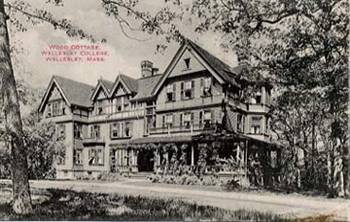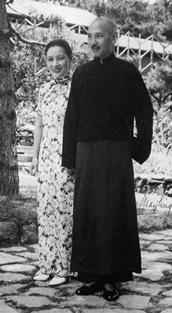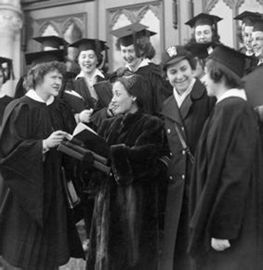Mayling Soong, who became Madame Chiang Kai-Shek,
is the Wellesley College Person of the
Week.
One of the most influential women of the
twentieth century, Mayling Soong was born in
March, 1897, in Shanghai. Her father Yaoju
"Charlie" Soong, was a Methodist minister
and businessman, who spent some 15 years
during the latter part of the 19th century
in the United States, where he earned a
certificate in theology at Vanderbilt
University in Nashville, TN. Her mother,
Kwei Twang Nyi, was a devout Christian and
strict disciplinarian.
The
fourth of six children, Soong came to the
United States in 1908, living near the
campus of the Wesleyan College for Women, in
Macon, GA, where her sister was a student.
She was tutored by
Wesleyan students, and attended school
in Demorest, GA. She was an excellent
student, who picked up English, which she
spoke with a Georgia accent, quickly.
In 1913, Mayling entered Wellesley College,
where she majored in English Literature and
minored in philosophy. In her senior year,
she was named a Durant Scholar, Wellesley's
highest academic distinction. She was a
member of the Tau Zeta Epsilon society and
was a casual tennis player and swimmer
during her Wellesley years. She boarded with
a Wellesley family her first year, and lived
in the Wood Cottage and Tower Court, on
campus, from her sophomore year through her
senior year. She was outgoing and popular,
and according to a friend, "There always
seemed to be some nice Chinese boy or other
on the doorstep of Wood."

Following
her graduation from Wellesley College in
1917, she returned to China, where she honed
her fluency in spoken Chinese, and studied
the classics and literature of China. She
did social work for the Y.W.C.A. in Shanghai
and was appointed to be a member of
Shanghai's Child Labor Commission.
Mayling met
Chiang Kai-shek in 1920. He was eleven
years her elder, and a Buddhist. Although he
was already married, Chiang proposed
marriage to Mayling, much to the objection
of Mayling's mother.
He
eventually won Mrs. Soong's blessing for
marriage to her daughter by providing proof
of his divorce, and after committing to
convert to Christianity. He told his future
mother-in-law that he couldn't convert
immediately, because religion needed to be
gradually absorbed, not swallowed like a
pill. He was baptised in 1929. A rising star
in the Chinese military, he became
Generalissimo Chiang Kai-shek, the leader of
the Nationalist Party, and engaged in a
struggle with communist factions which would
continue for the rest of his life.

Madame Chiang initiated China's New Life
Movement in 1934, with the goal of the
"physical, eduacational and moral rebirth of
the Chinese nation", based on traditional
Chinese values. In 1936, she assumed the
role of Secretary General of the Chinese
Commission on Aeronautical Affairs. She
said, " Of all of the inventions that have
helped to unify China, perhaps the airplane
is the most outstanding. Its ability to
annihilate distance has been in direct
proportion to its achievements in assisting
to annihilate suspicion and
misunderstanding..."
Madame Chiang Kai-shek was her husband's
English translator, secretary, advisor and
an influential propogandist for the
Nationalist cause. She distinguished herself
as a skilled negotiator during the "Xi'an
Incident". Following the refusal of
Nationalist forces in Sian, China, to engage
communist forces in December, 1936, Chiang
Kai-shek went to Sian, where he was
"arrested" by military subordinates. Madame
Chiang Kai-shek flew to Sian and
successfully negotiated the Generalissimo's
release, on Christmas Day.
In
February, 1943, Madame Chiang became the
first Chinese national, and the second
woman, to ever address a joint session of
the U.S. House and Senate, making the case
for strong U.S. support of China in its war
with Japan. She came to Wellesley College
the next month, her first visit to her alma
mater following her graduation in 1917. In a
nationally broadcast speech, Madame Chiang
addressed assembled students and faculty in
Alumnae Hall.

In 1949, when communist forces gained
control of China's major cities, Chiang
Kai-shek fled the mainland, and declared
Taipei, Taiwan to be the temporary capital
of China, where he was elected president.
Madame Chiang continued to play a prominent
international role. She was the honorary
chair of the American Bureau for Medical Aid
to China, a Patron of the
International Red Cross Committee,
honorary chair of the British United Aid to
China Fund, and First Honorary Member of the
Bill of Rights Commemorative Society.
Through the late 1960's she was included
among America's 10 most admired women.
President
Chiang Kai-shek died during his fifth term, in
1975. Following her husband's death, Madame
Chiang returned to the U.S., residing in
Lattington, NY.
Her many published works include This Is Our
China (1940), Sian: a coup d'Etat
(1941) and The Sure Victory (1955). Among
the institutions to grant Madame Chiang honorary
degrees are Boston University, Hahnemann Medical
College, Loyola University, University of
Michigan, and Wellesley College.
Madame Chiang Kai-shek passed away on October
23, 2003, at the age of 105.